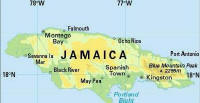 Jamaica’s cultural development has been deeply influenced by British traditions and a search for roots in folk forms, which are based chiefly on the colourful, rhythmic intensity of an African heritage. – As a nation we have a lot to be proud of. We are a happy people, we have our successes, we have our areas of excelling and we are a sovereign nation – says Dianne Lorrainne Francis, English tutor currently based in Warsaw, an expat from Jamaica.
Jamaica’s cultural development has been deeply influenced by British traditions and a search for roots in folk forms, which are based chiefly on the colourful, rhythmic intensity of an African heritage. – As a nation we have a lot to be proud of. We are a happy people, we have our successes, we have our areas of excelling and we are a sovereign nation – says Dianne Lorrainne Francis, English tutor currently based in Warsaw, an expat from Jamaica.
 Sense of Humor
Sense of Humor
– We enjoy a good laugh. We have plays, skits, pantomimes, the whole works. We have such a keen sense of humour that the Brits used to premiere theatrical pieces in Jamaica first before putting them out to the British Public. If we like them, they are worth liking. Our sense of humour is quite deep and intellectual. We do not favour tasteless American innuendos and trash talk – explains Dianne Lorraine Francis, an expat from Jamaica* (see below the article).
Special Customs
– Every culture has special customs. We have too many to list. For example, when one travels it is a custom that one brings gifts from the land they are coming. Gifts that awe do not in our country like that country’s sweets, perfumes, snacks etc. These of course are usually given in packages with bars of soaps and socks/underwear. It’s just our thing. We also always eat Spanish Rice and Peas on Sundays. And we make Sorrel Punch at Christmas. We always go out and open gifts on Boxing Day (Dec. 26th). That habit has slavery historical roots. We ‘flour’ people on their birthdays. Its our way of making them the cake. We throw flour, water, eggs, milk and liquor on them. We do this all day until midnight. On your birthday we suggest you not wear your best clothes outside and you can expected to be floured more than once. Each friend has a duty to do this to you – tells Dianne, English teacher, now based in Warsaw.
 Education
Education
The establishment of the Jamaican education system for the masses took place just after the emancipation of the slaves. Primary education is free and, in some areas, compulsory between the ages of 6 and 11. Now nine – tenths of women and four – fifths of men are literate. Institutions of higher learning include the College of Agriculture, the University of Technology, the University of the West Indies, and teacher – training colleges. -Women actually have more rights than men these days. There are laws protecting them and advocates fighting for them. But, we as Jamaican women still complain as we would like to dominate ! No, not really, it is just that our men are rather assertive and persistent. So we still feel the need to quell them a little more. They respect us, they just at times act like idiots and ignorants in an effort to try to impress us and their peers. It also depends on the family the person is from, we have many religions in our small nation and as such, to each his own. But in a general scale, and from my experience, we are pretty much equal … or at least very close to gender equality. Note though that in effort to protect our feminine rights the government at times makes us feel helpless and defenseless. As such, us Jamaican women don’t rely in the protection of others, we like to take matters into our own hands – tells Dianne from Jamaica.
 Family life
Family life
Family life is central to most Jamaicans, although formal marriages are less prevalent there than in most other countries. Most of the Jamaicans live in extended families. It is common for three generations to share a home. Many women earn wages, particularly in households where men are absent, and grandmothers normally take charge of preschool children. – My culture is quite collective. We are the kinds of people who look out for each other and everybody’s business is our own. We loan each other cups of sugar, treat everyone like a brother and are very hospitable – explains Dianne.
Cuisine
– In terms of food, Poland and Jamaica are worlds apart ! Our national dish is the Ackee and Saltfish. Ackee is a fruit (something like lychee – only cooked) and the Saltfish is dried salted Codfish. You have to try it to realize why we love it ! Our fruits are tropical as our climates allow. We have a large variety, one of the things I miss about home. Back in Jamaica, we have over 26 types of mangoes and in Poland, they only know one kind. Fruits back home are easily accessible as practically every backyard has trees … fruits here (in Poland) are expensive and typical. In Jamaica we eat every part of the animal we slaughter. From the chicken to it’s liver and gizzards to it’s feet ! I am yet to find Chicken feet in Poland. Our methods of cooking are various as well, being that Jamaica is a melting pot of cultures, the foods come with that too. We bake, broil, steam, poach, BBQ, Grill, Jerk, stew, fricassee, deep fry, curry and roast. Our eating manners are of course, western. We dine with knives and fork etc. We never burp at the table and eating with one’s hands is considered rude. Unless of course done alone and in private. – tells Dianne about Jamaican cuisine. – Oh, by the way, the spices are rather integral. I had to take my spices for cooking with me. I cannot find a single one here in Poland ! And the spices here are too bland for my taste – buds. Some are good, but I prefer spicy and hot. Eastern Europeans don’t really like that – she added.
Well, well, I absolutely agree. I am Polish but my taste seems to be the same as Dianne’s. I prefer spicy, hot cuisine, and … all that stuff sweeten by sugar cane. ‘Some Like it Hot’ is my favourite film. It was directed by Bill Wilder, and the main character is Sugar Kowalczyk, starring Marilyn Monroe.
The Jamaicans eat main meal almost always in the evening. The reason is most people do not have time to prepare a midday meal and children normally eat at school. On Sunday, all families enjoy a large and sociable brunch or lunch, usually including chicken, fish, yams, fried plantains, and the ubiquitous rice and peas (rice with black – eyed peas). One of Jamaica’s most popular foods is jerk (spiced and grilled) meat.
Relax …
– Jamaicans are far from reserved. We love a good laugh, we enjoy a good conversation and we have very bad phone manners. We are on the phone and it sounds as if the person we are speaking to is deaf – says Dianne. Introductions for us are generally casual. So, first name basis. However, if it is a business meeting or a formal gathering then of course impression is on the agenda. Titles and surnames usually does that for us. When two men meet, we greet the western way – a formal handshake. The firmer the shake the more respect is in the greeting. Close physical contact is not common among men unless it is a very close relative, say father and son. Two women either do the same as the men or they hug. As for men and women greetings…either way is acceptable – says Dianne.
Sports
Since independence Jamaica has consistently produced world class athletes in track and field. Usain Bolt is one of world class sprinters is a record holder in the 100 m for men at 9.58 s, and 200 m for men at 19.19 s. -We are superb at Track and Field ! Usain Bolt is proof of that. We are an athletic nation, funny thing is, we don’t try … it just happens. For that, we brag. Our Danchall and Reggae is world renounced. We are great dancers and our ladies are shapely (without effort). We love soccer. But our favourite pass – time is playing Dominoes – explains Dianne Lorrainne Francis.
Rastafari Movement
Clothing styles of the Jamicans vary. Rastafarians, a tiny part of the population, typically wear loose -fitting clothing and long dreadlocks, a hairstyle associated with the Ethiopian emperor Haile Selassie I in the early 20th century. The reason is this Back to Africa movement believes that Haile Selassie was God incarnate, the returned black messiah, come to take the lost Twelve Tribes of Israel back to live with him in Holy Mount Zion in a world of perfect peace, love and harmony. Bob Marley, the most famous reggae artist from Jamiaca who was a convert to the faith, spread the message of Rastafari to the world.
Maya Kowalczyk
*Ms. Dianne Francis is fun – loving and gregarious. She likes to think of herself as easy – going and simplistic. Right now, she is 21yrs old, a second year MA Psychology student. She is an English tutor working in Warsaw, Poland.
Contact :
Ms. Dianne Francis
Private English Tutor (Native Speaker)
Jamaican in nationality but versed in both the Queen’s English and American English.
B.A. in Linguistics and Languages at the University of the West Indies.
Much experience in working with both adults and children alike.
Email: dianne.lorrainne.francis@gmail.com
No.: +48600887020
